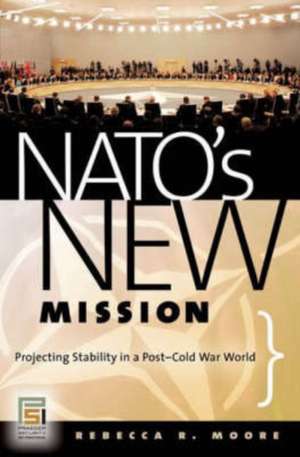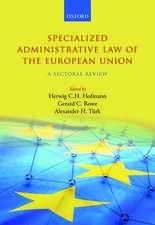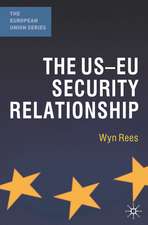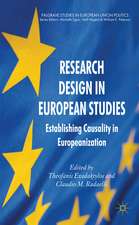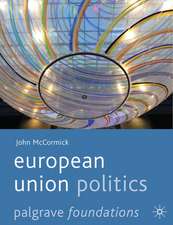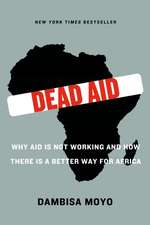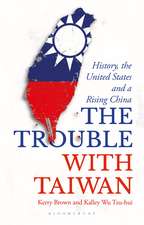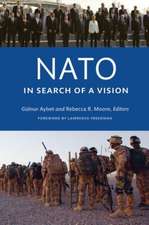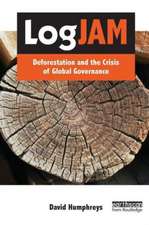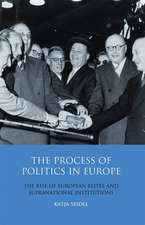NATO's New Mission: Projecting Stability in a Post-Cold War World: Praeger Security International
Autor Rebecca R. Mooreen Limba Engleză Hardback – 27 feb 2007 – vârsta până la 17 ani
Din seria Praeger Security International
- 18%
 Preț: 334.19 lei
Preț: 334.19 lei - 8%
 Preț: 335.53 lei
Preț: 335.53 lei - 34%
 Preț: 376.10 lei
Preț: 376.10 lei - 46%
 Preț: 443.64 lei
Preț: 443.64 lei - 29%
 Preț: 240.11 lei
Preț: 240.11 lei - 8%
 Preț: 304.56 lei
Preț: 304.56 lei - 34%
 Preț: 373.82 lei
Preț: 373.82 lei - 19%
 Preț: 412.79 lei
Preț: 412.79 lei - 19%
 Preț: 338.42 lei
Preț: 338.42 lei - 18%
 Preț: 335.62 lei
Preț: 335.62 lei - 27%
 Preț: 377.35 lei
Preț: 377.35 lei - 27%
 Preț: 376.75 lei
Preț: 376.75 lei - 18%
 Preț: 336.46 lei
Preț: 336.46 lei - 18%
 Preț: 321.73 lei
Preț: 321.73 lei - 27%
 Preț: 384.51 lei
Preț: 384.51 lei - 18%
 Preț: 320.50 lei
Preț: 320.50 lei - 18%
 Preț: 320.50 lei
Preț: 320.50 lei - 18%
 Preț: 321.35 lei
Preț: 321.35 lei - 24%
 Preț: 420.54 lei
Preț: 420.54 lei - 14%
 Preț: 335.99 lei
Preț: 335.99 lei - 18%
 Preț: 355.82 lei
Preț: 355.82 lei - 18%
 Preț: 319.83 lei
Preț: 319.83 lei - 18%
 Preț: 334.28 lei
Preț: 334.28 lei - 32%
 Preț: 354.48 lei
Preț: 354.48 lei - 14%
 Preț: 335.14 lei
Preț: 335.14 lei - 38%
 Preț: 405.98 lei
Preț: 405.98 lei - 40%
 Preț: 571.34 lei
Preț: 571.34 lei - 18%
 Preț: 321.85 lei
Preț: 321.85 lei - 18%
 Preț: 323.25 lei
Preț: 323.25 lei - 18%
 Preț: 253.28 lei
Preț: 253.28 lei - 40%
 Preț: 571.50 lei
Preț: 571.50 lei - 14%
 Preț: 333.72 lei
Preț: 333.72 lei - 18%
 Preț: 301.73 lei
Preț: 301.73 lei - 19%
 Preț: 352.96 lei
Preț: 352.96 lei - 26%
 Preț: 387.80 lei
Preț: 387.80 lei - 18%
 Preț: 302.77 lei
Preț: 302.77 lei - 14%
 Preț: 333.91 lei
Preț: 333.91 lei - 17%
 Preț: 325.80 lei
Preț: 325.80 lei - 24%
 Preț: 338.58 lei
Preț: 338.58 lei - 34%
 Preț: 414.73 lei
Preț: 414.73 lei - 18%
 Preț: 354.30 lei
Preț: 354.30 lei - 29%
 Preț: 254.29 lei
Preț: 254.29 lei - 18%
 Preț: 354.11 lei
Preț: 354.11 lei - 18%
 Preț: 334.38 lei
Preț: 334.38 lei - 14%
 Preț: 302.68 lei
Preț: 302.68 lei - 18%
 Preț: 322.97 lei
Preț: 322.97 lei - 27%
 Preț: 376.50 lei
Preț: 376.50 lei - 27%
 Preț: 322.81 lei
Preț: 322.81 lei - 27%
 Preț: 382.91 lei
Preț: 382.91 lei - 18%
 Preț: 320.87 lei
Preț: 320.87 lei
Preț: 335.22 lei
Preț vechi: 390.81 lei
-14% Nou
Puncte Express: 503
Preț estimativ în valută:
64.15€ • 67.11$ • 53.29£
64.15€ • 67.11$ • 53.29£
Carte tipărită la comandă
Livrare economică 02-16 aprilie
Preluare comenzi: 021 569.72.76
Specificații
ISBN-13: 9780275992965
ISBN-10: 0275992969
Pagini: 224
Dimensiuni: 156 x 235 x 23 mm
Greutate: 0.5 kg
Editura: Bloomsbury Publishing
Colecția Praeger
Seria Praeger Security International
Locul publicării:New York, United States
ISBN-10: 0275992969
Pagini: 224
Dimensiuni: 156 x 235 x 23 mm
Greutate: 0.5 kg
Editura: Bloomsbury Publishing
Colecția Praeger
Seria Praeger Security International
Locul publicării:New York, United States
Notă biografică
Rebecca R. Moore is Associate Professor of Political Science at Concordia College in Moorhead, Minnesota, where she chairs the Global Studies program. She teaches courses in U.S. foreign policy, international relations, and international security and she has published previously on NATO, U.S. human rights policy, and the promotion of civil society in China. She held a NATO-EAPC Fellowship from 2001 to 2003.
Recenzii
Moore offers a detailed analysis of the North Atlantic Treaty Organization's continuing relevance in the post-Cold War world. Beginning with the demise of the Soviet Union, Moore details the dramatic transformation of the alliance from one based on collective defense to one whose contemporary mission is to extend stability far beyond its geographical boundaries. The book depicts NATO's relevance to a Europe whole and free and the tools adopted to become an agent of change. Through enlargement, NATO has acted as a tool for democracy promotion. Moore's examination does not dismiss the negative repercussions of US actions after September 11, including the controversy over Afghanistan and intervention in Iraq, but argues that the crisis in the alliance acted as a catalyst for NATO's ongoing attempt to redefine its strategic vision. Moore posits that measuring NATO's relevance solely based on military capabilities discounts the important political role it has played in extending stability beyond Europe. The question regarding how global NATO will become may be answered by whether its identity remains a western alliance or becomes a global alliance of democratic states. Highly recommended. Upper-division undergraduates through faculty.
